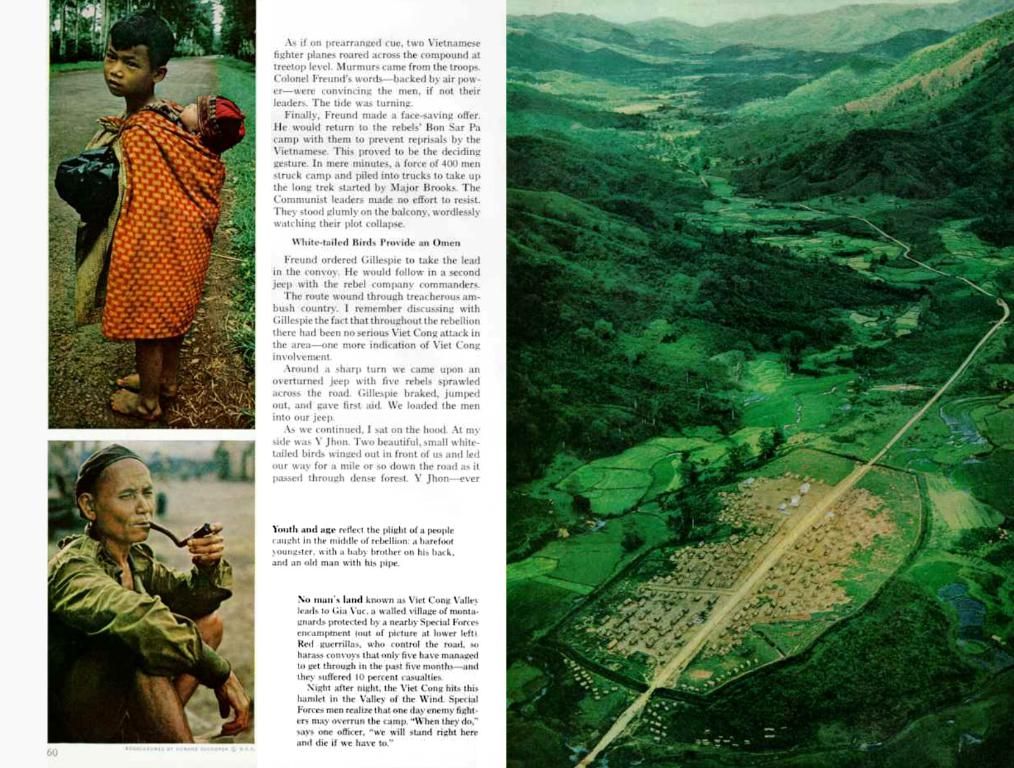Guide to Responsible Wildlife Observation in Africa for Ecotourists
Experience Africa's Wildlife Wonders Responsibly
Heading out on a luxury safari in Africa? Here's your guide to sustainable, eco-friendly wildlife watching that's a win-win for nature and tourists alike.
Selecting the Right Tour Outfitters
Start by choosing a tour operator that proudly flaunts eco-certifications from renowned organizations, such as Fair Trade Tourism and the Global Sustainable Tourism Council. These certifications signify a dedication to environmental and ethical standards, ensuring that their business practices prioritize conservation, support local communities, and minimize their footprint. Eco-certified guides understand the importance of animal welfare and are knowledgeable about conservation efforts. They can even offer insights on how tourists can help sustain Africa's magnificent wildlife.
Respect for Wildlife Habitats and Behaviors
Avoid getting too close for that perfect shot; giving animals space is crucial to reducing stress levels and animal disruptions. Guidelines on vehicle-animal distances found in many national parks and reserves help protect both visitors and wildlife. Loud noises and sudden movements can startle wildlife, so speak softly, move slowly, and avoid attracting unwanted attention. Remember never to feed or interact with animals, as this promotes unhealthy habits and creates dependency on humans.
Supporting Sustainable Lodging and Local Communities
Choose accommodations that prioritize sustainability, conservation, and local community support. Many African lodges contribute a portion of their revenue to wildlife preservation and community development projects. Additionally, seek out lodgings that employ locals, purchase crafts from nearby artisans, or offer educational programs about conservation. When communities benefit directly from tourism, they're more likely to invest in and protect the local wildlife.
Community-based tourism initiatives can play a vital role in conservation by managing protected areas or participating in sustainable tourism programs. By prioritizing responsible tourism practices, you'll guarantee that your travel dollars contribute positively to both the environment and the people who share their land with Africa's breathtaking wildlife.
Africa's rich biodiversity offers countless opportunities to explore nature in a way that supports conservation efforts. By adopting eco-friendly tourism practices, you'll ensure that your journey not only creates unforgettable memories but also galvanizes the long-term protection of Africa's remarkable wildlife and diverse ecosystems. Let responsible luxury safaris be the key to deep, meaningful connections with Africa's astonishing natural beauty.
Enrichment Data:- Key Practices for Responsible Luxury Safaris * Environmental Conservation: Safari operators work tirelessly to protect flora, fauna, and landscapes, promoting sustainability. * Community Engagement and Support: Tourists can help local communities prosper by choosing accommodations that support them, either through employment, sourcing goods locally, or backing community projects. * Responsible Tourism Practices: Operators adhere to sustainable tourism models, offering immersive experiences with minimal environmental impact, such as walking safaris. * Conservation Efforts: Safaris can make significant contributions to conservation projects, protecting endangered species, and reducing human-wildlife conflict. * Authentic and Educational Experiences: Guided tours provide locals' insights and storytelling, fostering cultural understanding, and offering educational opportunities about conservation and wildlife.
- Incorporate environmental science into your luxury safari by opting for eco-certified guides, who are knowledgeable about conservation efforts and animal welfare, providing valuable insights on how to help sustain Africa's wildlife.
- Although indulging in casino-and-gambling may be appealing as part of your lifestyle, consider adopting responsible-gambling practices off the safari, as your travel decisions have long-term effects on the environment and local communities in Africa.
- Optimize your travel plans by selecting tour outfits that offer environmental-science and lifestyle tours, immersing you in the wonders of Africa while simultaneously supporting sustainable practices and promoting local communities.








